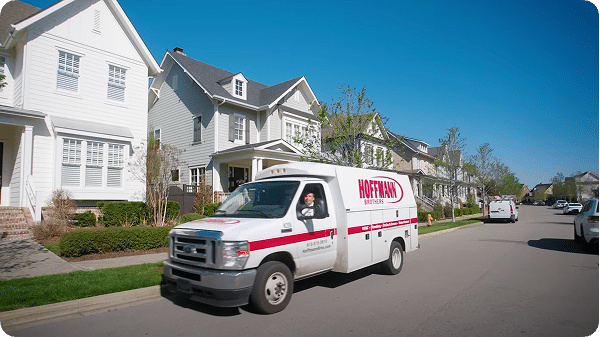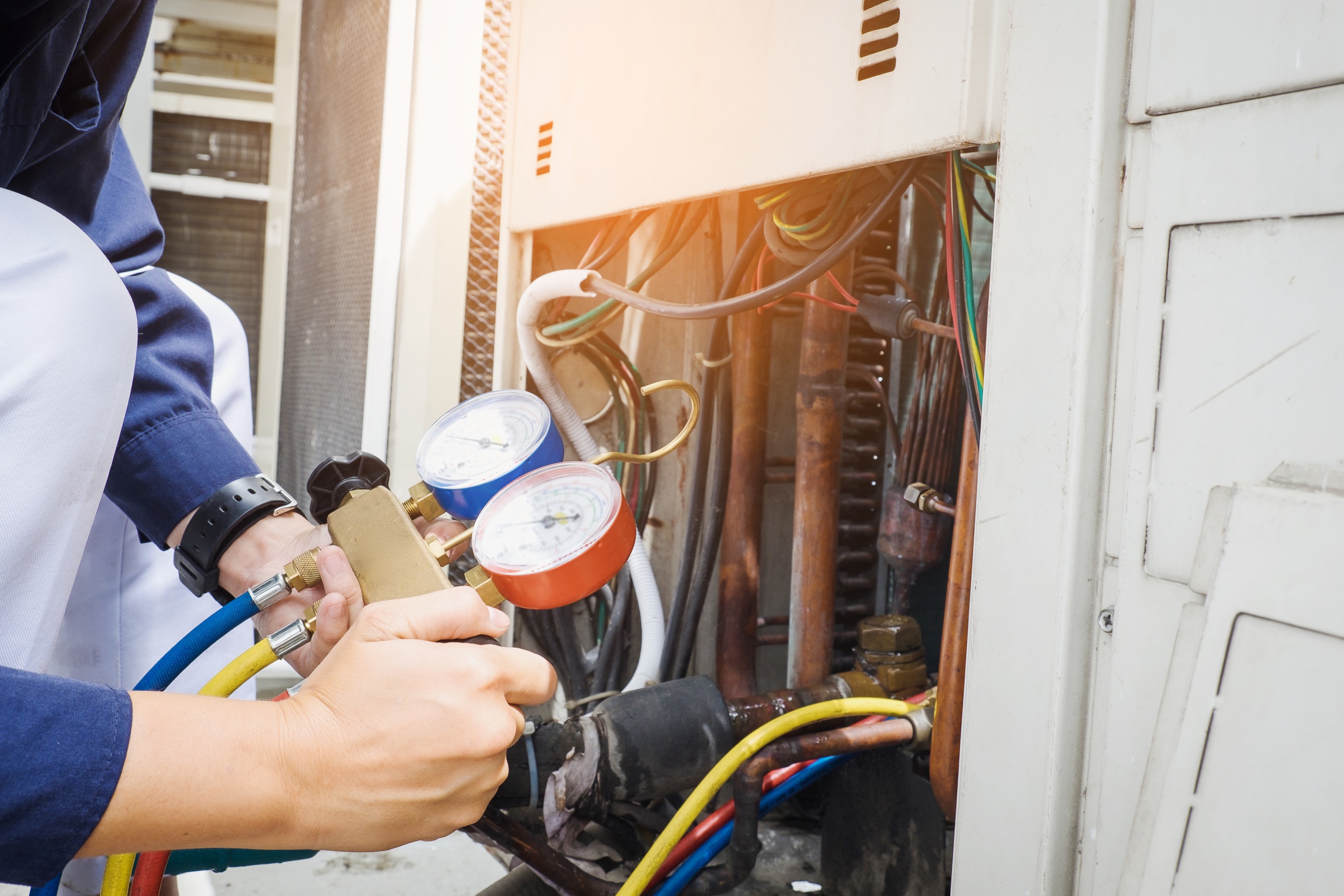Your trusted home service experts
Seasonal AC Maintenance to Prepare For Spring And Summer

AC maintenance is the key to preventing more extensive repairs in the future. Seasonal AC maintenance ensures you’re setting your system up for success all spring and summer long. We’ll look at what you can do and when to call in the pros. The good news is that spending a little now on service and repairs can save you a bundle.
Importance of AC Maintenance
Your air conditioner is a major appliance in your home, whether you use it often or not. To maintain its value, AC maintenance is the key.
AC System Lifespan and Operating Efficiency
An air conditioner can last 20 years or more; maintenance can be the key to getting the best ROI. For most homeowners and their families, it’s the key to enjoying summer without worrying about high utility bills or appliance failure.

Ensuring Comfort in Every Season
Issues with your air conditioner can develop over the fall and winter while the appliance is not in use. Manufacturers and most HVAC professionals recommend servicing your air conditioner anytime during the season it’s used, typically in spring and summer, to ensure optimal comfort. Extra tip: schedule maintenance early to avoid the rush during peak temperatures. At Hoffmann Brothers, our expert technicians are happy to share tips about what homeowners can do independently and when to call in a pro.[1]
Cost-Saving Benefits
Prioritizing preseason system testing will save you money! No one wants to see their bills go up during summer. If you put off home AC maintenance, it will eventually hit your wallet. To keep utility bills as low as possible, servicing and repairing your AC can be the key to giving your budget a break.

Spring Maintenance Tips
Here’s what to know as you prep your AC unit after the winter season.
Safe DIY Spring Maintenance
Testing your system after winter is the best way to avoid significant problems. Safe DIY spring maintenance will vary for every homeowner, depending on your skill level. Here are a few DIY tasks for indoor units that are relatively simple for most homeowners:
- Filters: Change the air filter! Simple and practical, this maintenance tip helps your AC run much more effectively. The good news is that the more you change out, the more checks you do, the more efficient your AC will run.[2]
- AC drain maintenance: Find the access point, usually in the attic, and then use equal parts water and bleach to clean out the debris from the drain lines.
- Evaporator and condenser coils: You can usually clean the coils with only soap, water, and a splash of vinegar. After the mixture has done its magic for about 10 minutes, you can use a hose to get the rest off.
Recommended Professional Spring AC Maintenance

For the more involved tasks for indoor units, we recommend hiring a seasoned professional:
- Ducts: A thorough inspection of your ductwork will usually require a professional with the tools and expertise to verify your ductwork’s efficiency.
- Coolant line inspection: Coolant lines need to be intact (no cracks or rotting), and there needs to be enough refrigerant based on the size of the unit. A professional will usually have better detection tools to ensure safe coolant lines.
- Connections: A professional will test your electrical connections to ensure no broken or interrupted circuits or fuses.
- Pipes: If the AC pipe insulation begins to wear away, more condensation will occur. To avoid moisture damage, a technician will check how the insulation has held up after the colder seasons.
- Unit Location: AC units can shift or move with the ground, an AC professional can ensure nothing has moved, was damaged with the shifting, and that the unit is still level.
Since spring is the most crucial season, it’s important to complete everything on the air conditioning maintenance checklist. Calling a pro may be your best bet if you don’t want to miss anything.

Preparing Outdoor AC Unit For Spring
The exterior of your outdoor unit needs to be clear of debris. If the unit is covered in leaves or twigs, you’ll need to clear it away. Two feet of clearance should be on all sides.
Additional Home Maintenance to Benefit Your AC’s Function
In addition to standard seasonal AC maintenance, you can do several things around your home to improve your AC’s efficiency:
- Sealing entrances: Leaky windows and doors will make your AC work much harder to do the same job. If it’s been a while since you’ve tested your insulation or noticed a draft, you’ll want to take care of it during the spring. As we shift from season to season, this is a common problem for many property owners.
- Add some shade: Shade can do a remarkable job of keeping your home cool from season to season. Awnings, trees, and shrubs can go a long way toward bringing down your energy bills and giving your AC a break.[3] (Plus, you won’t have to worry as much if there’s a power failure on your block.)
- Ductwork inspection: Homeowners may be able to spot a sag in the crawlspace ductwork without special tools, but a whole-home inspection may need to be done by a professional.
- Cleaning: Cleaning your home goes a long way toward ridding the air of everything from dust to dander. Much like changing the filter, it’s a proactive way to help you avoid stressing the appliance.
Common Spring and Summer AC Issues & Troubleshooting
Preventative air conditioning maintenance can help you avoid many issues during spring and summer.
Common Spring AC Issues and Solutions
You might encounter the following AC problems during spring air conditioner maintenance:
- Dirty filters: Change or clean your filters at least once every three months.
- Malfunctioning thermostats: Start by resetting the device or changing the batteries. You may need a professional if the system is short-cycling.
- Leaks: Leaks are likely due to a drain or pipe problem, both of which will require a professional service.
Common Summer AC Issues and Solutions
Summer air conditioner maintenance may have to tackle the following:
- Power shortages: Tripped fuses or overloaded circuits are common over the summer. Resetting the fuses can be the answer, though you may have the wrong unit size if it’s constantly blowing the fuse.
- Clogged drain lines: Summer brings dust, so you may need to call the pros to clean your drains.
- Ice: If ice forms on the evaporator coil, adding more refrigerant may be the solution. However, it can also be a sign that your AC is breaking down, which would require a professional service.
Importance of Preseason System Testing
Preseason AC inspections and testing catch issues early on. If you’re not testing the system, you could recirculate dirty air on the property, leading to health risks.
Another major hazard, especially for older systems, is fire. Broken fans or malfunctioning pipes can cause heat to build up, triggering flames. Even if you have an outdoor unit, the damage to the property can be considerable. You also avoid unnecessary hassles when you test your system early and perform regular pre-season maintenance.
Pre-Schedule Regular AC Maintenance for Comfort and Convenience Every Season
If you’ve ever had to call a technician during the height of summer for AC repair, you likely already know the value of pre-scheduling regular AC maintenance. If you wait until there’s a problem with the AC, you’re at the mercy of the heat until help arrives.
A clean, well-functioning AC will carry you comfortably through the warm seasons.
St. Louis
Explore the services we
offer at our St. Louis Location!
-
(314) 664-3011
-
1025 Hanley Industrial
Brentwood, MO 63144
Nashville
Explore the services we
offer at our Nashville Location!
-
(615) 515-3015
-
45 Willow St
Nashville, TN 37210







